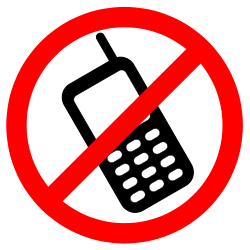Course, Interrupted: Handling Problem Behaviors in Your Classroom
AFYE Events
- Check the AFYE Home Page for current and upcoming events.
Archive and Library
- About AFYE
- The AFYE Archive
- The AFYE Library: located in CIELO (Sierra Hall 4th floor). Download and review the list of titles and authors from the AFYE home page.
- The CSUN AFYE Listserv sends out occasional emails of interest to CSUN faculty and staff who work with first-year students. To add (or remove) your name, email Cheryl Spector.
Other resources
- Academic Technology at CSUN
- Free Adobe Acrobat Reader and Excel Viewer
- Tomorrow's Professor (Stanford Center for Teaching and Learning)
- The Toolbox (online professional development newsletter)
Search the AFYE website:
Program details:
Most CSUN students approach learning with care. They want to do well, and they understand how to comport themselves in the classroom.
But consider this scenario: You're trying to teach when, yet again, a cell phone rings in your classroom. You've had a clear statement about that in your syllabus for many semesters now, so you are not worried. But this time, the student takes the call and keeps on talking, even as you point to the door. When the call finally ends, you put your foot down. But the student insists that cell phone use is perfectly legal. You feel completely frustrated.
What are your options? When--and whom--should you call for help? Aren't you in charge of teaching and learning in your own classroom?
Our panel of CSUN experts reviews ways of handling problem behaviors in the classroom, ranging from out-of-bounds cell phone use, to inexplicable displays of immaturity or social awkwardness, to sudden shouting matches and other forms of aggressive and inappropriate behavior.
Includes Q & A session with the panelists. Past presentations: spring 2013 and fall 2013. Next presentation: spring 2014, to be announced.


Workshop presenters:
- Anne Glavin, Chief, Department of Police Services
- Sam Lingrosso, Student Conduct Coordinator, Student Affairs
- Anne Eipe, University Counseling Services
- Julie Pearce, University Counseling Services
- Jodi Johnson, Disability Resources and Educational Services (DRES)
Co-sponsors:
AFYE, California Faculty Association Northridge, and Faculty Development. Particular thanks to CSUN faculty member Kris Kouri for first suggesting this session.
Workshop Resources:
- Assisting Students in Distress: University Counseling Services manual for faculty and staff, written by Anne Eipe, Ph.D. & Julie Pearce, Psy.D., rev. summer 2009 (.pdf)
- Emergency Desk Reference: Department of Police Services at CSUN
- Responding to Disruptive or Threatening Student Behavior: A Guide for Faculty (Student Affairs, rev. May 2012) (.pdf)
- "See something? Say something!" Students of Concern Response Guide (.pdf)
- Student Conduct Code (California Code of Regulations, Title 5, Article 2)
- Student Conduct & Discipline (CSUN Student Affairs)
- Before You Assign Another Group Project . . . . Six Keys to Creating Effective Group Assignments and Team Projects by Wendy Yost (CSUN faculty member Wendy Yost mentioned this extensive web-based resource, originally prepared for Faculty Development in 2011, during the spring 2013 workshop and volunteered to share it with us)
- Sample course agreement page from FCS 441 (Human Sexuality) syllabus (pdf, 8 kb): one way you may be able to clarify student understanding of your course content and format (from faculty member Richard MacDonald, FCS)
- The Department of Police Services at CSUN will offer a two-part workshop in fall 2013 on Dealing with Workplace Violence. For more information: http://www-admn.csun.edu/dps/police/docs/workplace-violence-new.pdf
